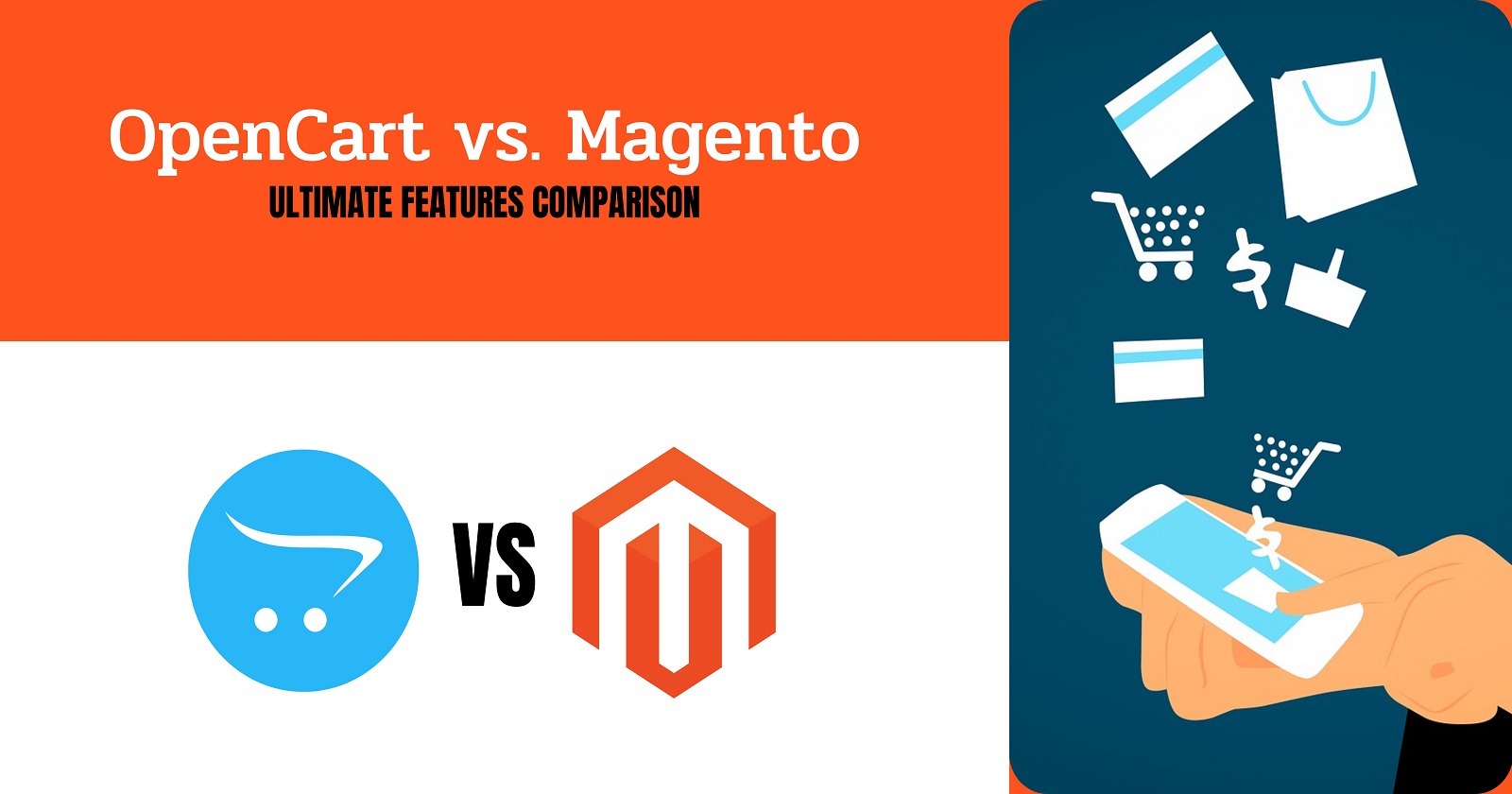OpenCart vs. Magento - Ultimate Features Comparison
 Morgan Stark
Morgan Stark
One of the most common questions for business owners when considering starting an online store is, "Which platform to choose while opening up an eCommerce Store?" It is becoming very challenging for business owners to choose the right eCommerce platform as the market offers many different eCommerce platforms.
OpenCart and Magento are two of the biggest and most commonly chosen eCommerce platforms to create and store online.
The selection of content management system(CMS) platforms depends on significant factors such as the size of the store, design, SEO, and budget. Magento and Opencart offer solutions for unique needs, so it is tough to choose a suitable platform for your business. Confused about choosing the best eCommerce platform between Magento vs. OpenCart? By the end of this article, you can decide which eCommerce platform you need for your online store.
Let us begin with the basics.
What is OpenCart?
As per BuiltWith, about 342,898 live websites and 86,295 domains have been powered by OpenCart. Almost all small and mid-sized companies globally use OpenCart as their eCommerce platform. When it comes to popularity, OpenCart is exceptionally creative. OpenCart is an open-source eCommerce platform developed on PHP/MySQL code that is suitable for high customization and low development costs.
It is a platform with an intuitive dashboard, unique features, and a user-friendly and active user community. Its simple and user-friendly administration dashboard helps you manage products, promotions, orders, and reports without requiring technical knowledge. OpenCart has been kept updated periodically with the latest versions of itself.
Several benefits of OpenCart:
OpenCart's User-friendly interface makes adding products, managing orders, and customizing your online store simple.
It is a free, open-source platform where you don't need to pay for licensing or another fee.
It is highly flexible, customizable, supports multiple languages & currencies, and is also Search engine friendly.
Large community members are always there to help if you encounter any problem.
What is Magento?
As per BuiltWith, about 151,526 live websites and 564,680 additional sites have been powered by Magento. Magento is a powerful eCommerce platform suitable for large companies with huge budgets. Magento empowers about 1.2% of all websites. It is designed for complex stores, so if you consider scaling up your online store, Magento is the best eCommerce platform. It offers unique features like catalog management, order management, customer management, checkout, and strong security for your online business.
Several benefits of Magento:
Magento is highly scalable, as It can handle thousands of products without compromising performance.
It is highly customizable, allowing you to choose from thousands of extensions and themes to create a unique online store that reflects your brand.
Magento offers advanced and trending features, such as multi-store support, mobile responsiveness, and integration with various payment gateways.
It allows you to provide a seamless shopping experience to your customers.
Magento is built with security in mind, with features such as secure payment gateways, SSL encryption, and regular security patches.
OpenCart vs. Magento – Ultimate Features Comparison
Before getting in deep, Here is the complete Ultimate Features Comparison of OpenCart and Magento.
OpenCart | Magento |
OpenCart online page loading time is 831 milliseconds | Magento online page loading time is 665 milliseconds |
It has around 13,000 extensions available with unique features and themes | It has around 5,000 extensions available, allowing you to add on extended functionalities as per your needs |
It offers two types of support to its users. | Magento doesn't offer any live chat, email, or phone support for the users. |
OpenCart provides guaranteed support with monthly fees of $99. | Users can ask questions related to their queries to 300,000 active members in the Magento Community who share their technical knowledge. |
There are high chances of a cyber attack or hacking as it is an open-source platform. | Despite being an open-source platform, Magento offers robust security with 8 security features. |
OpenCart offers 36 default payment methods | Magento offers 2 default payment methods PayPal and Braintree. |
Other payment methods can be downloaded from OpenCart Extension Dictionary | You can add other payment gateways through Magento Connect |
OpenCart is capable of managing larger inventory. | Magento’s numerous extensions and features help to better inventory management. |
OpenCart is widely suitable for small businesses | Magento is best if you are running a larger store |
Requires less budget to start the OpenCart store | Requires a high budget to start the Magento store |
OpenCart requires less technically sound experts to create an online store | Magento requires technical experts with extensive expertise to create an online store |
Wrapping up:
Magento is a powerful eCommerce platform compared to OpenCart, but it requires technical expertise to develop an online store. OpenCart is a widely preferred eCommerce platform, and almost all small and mid-sized companies use OpenCart to build their online store.
That is all for OpenCart vs. Magento – Ultimate Features Comparison, and we believe you will choose the perfect eCommerce platform to create an online store. Contact Shiv Technolabs now, and Hire an Opencart dedicated developer or hire a dedicated Magento developer to create an online store with Magento or OpenCart. Our technical experts will help you choose and build a flawless eCommerce store; you just need to discuss your business size, product, targeted audience, and budget.
Subscribe to my newsletter
Read articles from Morgan Stark directly inside your inbox. Subscribe to the newsletter, and don't miss out.
Written by

Morgan Stark
Morgan Stark
As a full stack developer, I have expertise in both front-end and back-end development, with experience in building web applications from scratch. I am proficient in a variety of programming languages, including JavaScript, HTML, CSS, and various back-end languages such as Python, Ruby, and PHP. My skills also extend to database management, server configuration, and deployment, allowing me to create fully functional and scalable applications. I have experience with a range of frameworks, such as React, Angular, Vue, Django, Ruby on Rails, and Laravel, among others. In addition to technical skills, I possess excellent problem-solving skills, communication skills, and teamwork skills, allowing me to work collaboratively with designers, product managers, and other stakeholders to deliver high-quality and user-friendly applications. Overall, my passion for learning and improving my skills, coupled with my experience, makes me a highly versatile and effective full stack developer.